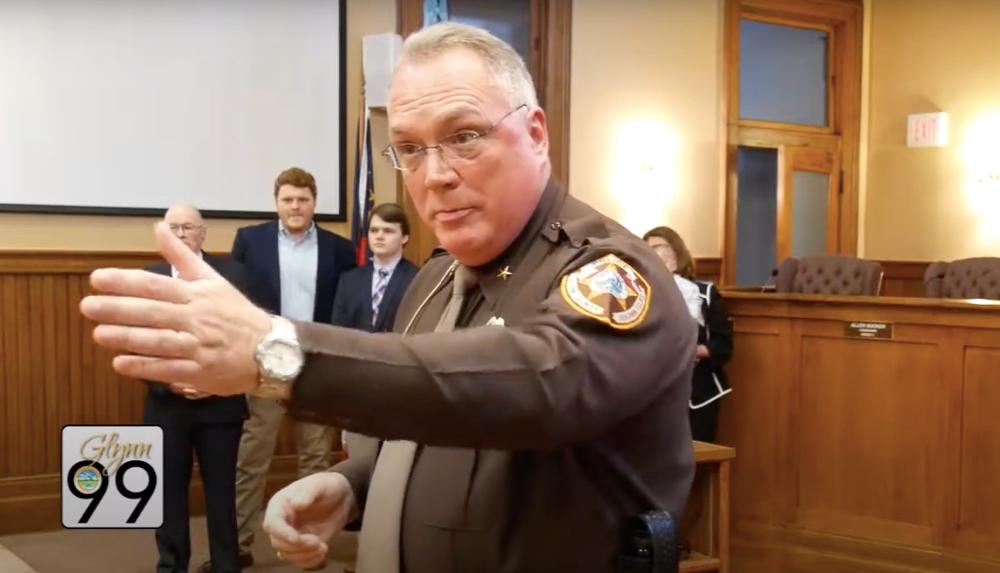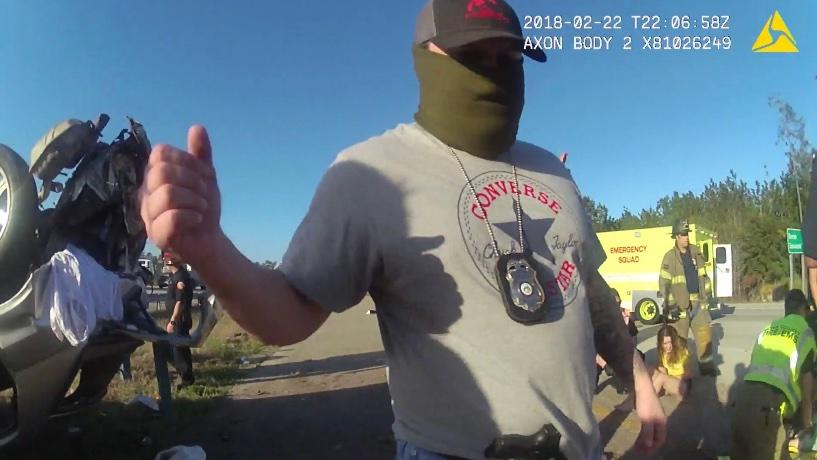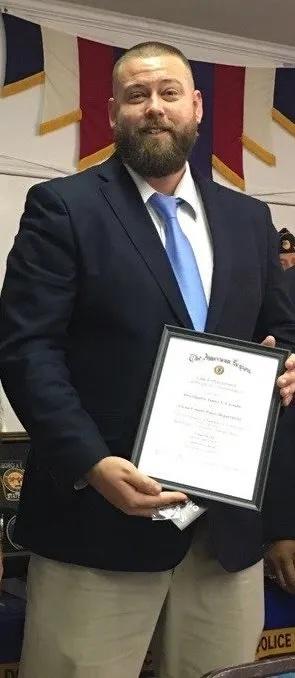
Caption
John Powell, former Glynn County Police chief, speaking to onlookers after being sworn in on January 26, 2018.
Credit: Glynn County, Screenshot

John Powell, former Glynn County Police chief, speaking to onlookers after being sworn in on January 26, 2018.
Jake Shore, The Current
When John Powell served as police chief of Glynn County, he often offered folksy aphorisms in response to problems. “You don’t turn around a ship in a day,” was a favorite, his former colleagues say.
The county hired the Florida law enforcement veteran in 2018 to take over a force mired in problems. The department’s state certification had lapsed. The police killing of Caroline Small had ruptured trust with the community. Rumors of corrupt cops prompted a proposal to abolish the police and merge it with the sheriff’s department.

John Powell served as police chief for a little more than two years before being indicted on charges of failing to investigate police misconduct.
Glynn County’s commissioners thought Powell could fix things, seeing in him a likable professional who understood them and the county.
But Powell’s tenure ended with the force in a steeper tailspin. On the chief’s watch, county police wrote off the murder of Ahmaud Arbery as a justified killing. Powell himself was indicted by two grand juries and was fired. He faces trial early next year in Glynn on charges Powell knew about and ignored misconduct within a narcotics unit under his command, and in one instance, allegedly assisted in covering up illegal actions.
Powell’s supporters, which are numerous in Glynn, consider him a target of a political witch hunt and a man of integrity. The former chief has pleaded not guilty. He and his lawyer, Thomas Withers of Savannah, have declined interview requests.
Yet the misdeeds alleged by prosecutors aren’t a surprise to multiple officers and colleagues who worked with Powell in three states during his 37-year career. Interviews with eight former supervisors, police officers and colleagues, as well as testimony from multiple previous court cases reviewed by The Current, show that the former chief courted controversy and legal challenges in multiple former jobs.
As police chief of the racially divided town of Dothan, Alabama, Powell hired a controversial cop from his own hometown whose violent past made him untouchable for Florida police. An officer on that force, meanwhile, accused Powell of being complicit in attempts to change legal testimony and protect problematic officers. Separately, a Florida sheriff whom Powell was seeking to unseat accused him of violating campaign finance law.
Glynn County leaders reviewed his past and saw no red flags.
Powell, 58, remains living in a cookie-cutter subdivision in north Brunswick tucked between I-95 and US-17, awaiting trial. State authorities have suspended his police credentials, and the county fired him on Jan. 7, 2021. He does not have a pension from the county.
When Powell was being considered for the Glynn police chief job, he had a reputation as a dedicated family man. He also shared a similar small-Southern-town upbringing with many of the county commissioners.

John Powell in 2017 at a law enforcement training weekend.
Born in Pensacola, Powell came of age at the end of Jim Crow, when police departments were often the last institution to integrate and prioritize equality. After completing high school, Powell immediately jumped into law enforcement, moving from Florida to South Carolina to North Carolina before landing the top job in Dothan in 2005.
Around that time, the Dothan Police Department had an acute problem with racism, according to residents. White officers had been photographed posing with a Confederate flag. Some also routinely used the N-word. Black officers said in lawsuits they had been passed over for advancement due to their skin color. Black residents accused police of planting drugs on suspects.
Rev. Kenny Glasgow, a voting rights advocate in Dothan, said he met with then-Chief Powell to educate him about the chasm between police and the Black community.
“When I tried to tell him about the corruption of the police department and things that they were doing … he (gave) us the political response. ‘He will help, he’s going to take care of it’,” Glasgow said. “Nothing ever happened.”

A picture of Rev. Kenneth Glasgow shaking hands with then-Dothan Police Chief John Powell, captured in an October 2006 edition of a defunct Black newspaper in Alabama, according to Glasgow.
Glasgow got more concerned after Powell hired a controversial cop in 2008 whom he had previously trained in Florida.
In Florida, Officer Darren Moody was disciplined, suspended and arrested for two incidents of domestic abuse after his supervisors reported that he hit two different girlfriends, according to court documents. He was never convicted.
Two other Florida police agencies declined to hire Moody due to his past misconduct, according to court documents. He bartended at a strip club before Powell hired him.
In 2012, Moody shot and killed a Black man in Dothan under controversial circumstances that inflamed the community. He was never charged in the killing of Christopher Thomas, 22.
A 2009 wrongful death lawsuit sparked questions about Powell’s oversight of other officers on his force.
One of Dothan police’s only Black female officers complained that Powell and the city attorney subjected her to harassment and intimidation in response to the 2009 lawsuit. Officer Raemonica Carney alleged that the city attorney tried to get her to change her statement regarding a drunk driving incident that caused a pedestrian’s death. Powell was complicit in that attempt, she said. His motivation was to protect the problematic white officers involved in that incident, according to her affidavit.
Carney did not respond to several requests for an interview.
Dothan city investigators determined he did nothing wrong, according to Powell.
A few weeks after Carney filed a formal grievance against Powell, he resigned and started a new job with the Florida Division of Alcoholic Beverages and Tobacco.
In Florida, Powell also contended with legal trouble.
He ran for sheriff twice in his home county of Escambia, once in 2004 and again in 2012.
In his first campaign, an investigator working for incumbent Sheriff Harry “Ron” McNesby compiled a dossier of character statements from officers who had worked with Powell years earlier. Their negative opinions about Powell were used in McNesby campaign materials, according to court filings.
Four different officers said Powell used internal affairs investigations, suspensions, and firings to arbitrarily punish officers he didn’t like, according to court documents. The officers said he acted unilaterally without listening to advice from veteran officers, and decided promotions and demotions with little explanation, according to court documents.
Powell later sued Sheriff McNesby for using dirty tactics to defame him.
Powell said the interviews were misrepresentations. Some officers said later that their remarks had been taken out of context, according to court documents.
McNesby declined to be interviewed for this story but called Powell “a good personal friend.”

John Powell unsuccessfully ran for sheriff of his hometown county in 2012. His candidacy suffered after a prosecutor charged Powell with violating campaign finance law weeks before the election.
Questions about Powell surfaced again when he ran for sheriff in the 2012 Republican primary against incumbent Sheriff David Morgan.
Powell’s campaign’s slogan was to “make Escambia County Safe Again,” according to an archived version of his defunct campaign website.
About two weeks before the election, a grand jury indicted Powell on one count of violating campaign finance law. The complaint was made by his rival, the incumbent sheriff.
Powell released a statement saying the purpose of the charge was “to cause embarrassment to me and my supporters.” He said he was not guilty of the accusations.
The incumbent cruised to victory with a whopping 77% of the primary vote.
Prosecutors dismissed the charge against Powell months after the election.
Powell came to Glynn County in 2016 to oversee public safety agencies such as the fire department, emergency management services, and animal control. Before he was named police chief, county authorities vetted Powell and found nothing worrisome in his professional background.
Alan Ours, who was Glynn County manager at the time, said he discussed Powell’s issues in Florida.
“I discussed it with John at length. I don’t remember everything he said to me (but) I remember his answers were satisfactory,” Ours said. “I felt like some of the things that took place with that sheriff down there were political in nature.”
Powell’s background check from the county’s human resources director did not show any issues from Dothan either, Ours said.
By late 2017, previous police chief Matt Doering announced his retirement after 14 years. Officials tapped Powell as interim chief and then hired him full-time in January 2018.
County authorities knew the police force was struggling. Powell’s mandate was to modernize the department, according to former county officials. Another priority was to regain state certification that lapsed shortly after Powell took the reins.
Powell immediately focused on some quick fixes such as changing the agency’s badge, uniforms and police cruiser designs, according to a former member of Powell’s command staff. The new chief also emphasized regulation haircuts and clean-shaven faces, the person said.
Powell modified officer shift schedules, extending them to save money on overtime and prevent lapses in coverage, the official said.

Powell took over as chief of the Glynn County Police Department in January 2018 with a tall order: reform its culture of unaccountability and restore its trust with the community.
Around the same time, an outside body, the International Association of Chiefs of Police (IACP), revealed deeper, structural problems as part of an internal audit.
The audit found that Glynn County Police had virtually no community policing focus, which emphasizes crime prevention and communication with citizens. Statistics weren’t regularly gathered for the purpose of analyzing crime trends nor demographic data were kept on those being policed – which prevented analysis of unbiased policing, it said.
The report found the standards for use of force to be vague and disorganized. Officers also told IACP that discipline was arbitrarily dolled out.
“There is a pervasive feeling that the discipline imposed depends on who you are and that accountability and discipline are uneven and unpredictable,” according to the September 2018 report.
But it was Powell’s response — or lack of response — to the existence of corrupt cops within his narcotics unit, which is the focus of the upcoming trial. According to court documents reviewed by The Current, during the grand jury proceedings that led to his indictment, Powell said he learned about potential illegal behavior in the unit in February 2019; witnesses called before the grand jury, however, said Powell witnessed such behavior as early as a month after he was hired.
The unit, called GBNET, was a joint task force of Glynn County and Brunswick cops, which had been operating since at least 2004.
According to officers and investigators who testified to grand jurors who indicted Powell, the former chief witnessed misconduct by his officers in February 2018 yet chose not to act. In one specific incident, Powell is accused of encouraging the behavior, according to a transcript of grand jury testimony delivered in February 2020 reviewed by The Current.
In February 2018 GBNET officers in pursuit of an alleged drug suspect called for a county officer to help stop a driver on I-95. The attempted traffic stop ended when the driver crashed and her passenger was killed following a high-speed chase.
GBNET officers arrived to the scene wearing ski masks and with guns drawn, according to grand jury testimony. One GBNET officer, who has already pleaded guilty to criminal wrongdoing, James Cassada, was at the crime scene. He recalled that the GBNET team was initially nervous about their new chief coming to the crash scene because “they didn’t know how he was going to react,” according to an investigator who interviewed Cassada and testified to the grand jury.

A masked Glynn County narcotics unit officer at the scene of a February 2018 crash, where GBNET officers allegedly sought to cover up their involvement.
Cassada, however, was surprised about Powell’s reaction: “F*** him, that’s what you get for running drugs,” he recalled him saying about the dead passenger, according to the transcript.
GBNET officers asked their Glynn County patrol colleague to omit from his report that GBNET initiated the stop, according to the indictment.
An investigator working for the Brunswick district attorney testified to the grand jury that Powell and two GBNET officers then applied pressure to keep GBNET’s involvement out of the incident report.
“There was a cowboy culture” at GBNET, according to Daras. “It was a culture of secrecy, a culture of no one can know anything. The GBNET reports were locked, no one was allowed to access them.”
Powell set the mood in the February incident. It “was like, ‘you’re good to go, keep going boys’,” according to Daras.
Powell’s supporters say Cassada’s plea deal to testify against Powell makes him an unreliable witness. They say Daras can’t be trusted because of his loyalties to former Brunswick-area D.A. Jackie Johnson, whom Powell accuses of instigating a witch hunt against him.
Yet GBNET’s activities and allegations of potentially troublesome behavior kept popping up on Powell’s radar.
In May 2018, according to his indictment, a Glynn County Sheriff’s deputy showed Powell a photo of a GBNET officer drinking at a bar with a convicted drug felon.
Powell told the grand jury that he didn’t recall any knowledge of the photo, and that officers interacting with felons was not a crime.
Powell also told the grand jury that the first time he became aware of potential wrongdoing within the GBNET unit was Feb. 1, 2019 and that he acted decisively to investigate.
His actions came in response to information obtained by a Brunswick officer assigned to GBNET. While preparing for trial, she reviewed a video interview with a confidential informant who was recorded saying she was having a sexual relationship with Cassada.
That Brunswick officer reported the allegation up the chain of command.
Powell said he immediately called the Georgia Bureau of Investigation.
“I was concerned that Investigator James Cassada had forced the sexual relationship offering money, swapping drugs or use his official position to prevent criminal charges,” Powell told the grand jury sitting in February 2020.
Powell also launched an internal affairs investigation. That resulted in discipline for two additional GBNET officers who had prior knowledge of Cassada’s sexual relationships with informants as early as 2017 but did not report the information.

Ex-Glynn County narcotics officer James Cassada pleaded guilty to violating his oath of office in July 2019 for relationships he had with drug informants.
In late March 2019, Powell disbanded GBNET, as a grand jury was moving to indict both of those officers as well as Cassada.
On July 19, 2019, Cassada pleaded guilty to violating his oath as a police officer. In exchange for his plea, he was sentenced to 10 years of probation and agreed to testify in the DA’s investigation of GBNET, according to The Brunswick News.
A first grand jury issued indictments against Powell on Feb. 27, 2020, three days after Ahmaud Arbery was murdered. Powell was arrested. His supporters say the entire investigation was politically motivated and had no merit.
Glynn County placed Powell on paid administrative leave the following day. The county fired Powell on Jan. 7, 2021.
In August 2021, a second prosecutor, Joe Mulholland from the South Georgia Judicial Circuit, presented fresh evidence against Powell to a new grand jury. That body added three new charges against Powell and removed several from the first bill of indictment.
The first grand jury focused mostly on Powell’s actions as chief when he learned about Cassada sleeping with informants. He was accused of influencing witnesses and testimony. The charges from the second grand jury built off of evidence provided in the first, that GBNET acted with impunity.
DA Mullholland is now attempting to prove that Powell ignored alleged illegal acts by GBNET. These included evidence that the unit was working undercover in neighboring Camden County without legal authority, and the unit had allegedly retaliated against a McIntosh County sheriff’s deputy who had criticized the unit’s operations in his jurisdiction.
The first time Glynn County residents will hear from Powell in the 16 months since his indictment is at the trial scheduled to start in late January.
According to the grand jury transcript made available to The Current, Powell has said this investigation has taken a toll on him personally.
“I’ve had to face the family embarrassment, professional embarrassment and emotional stress of this matter. I’ve had the personal financial burden to secure an attorney to provide me guidance in the judicial area to protect my interest and help me get the facts out,” Powell said.
Powell used a right afforded to him as a Georgia police officer not available to other citizens — to be present and testify at a grand jury proceeding investigating him.
Powell faces four courts of violating his oath of office as a police officer, all felony charges.
Powell’s lawyer has argued that the crimes the former chief is accused of aren’t actually crimes — they are rule violations within a police department. He should have been scrutinized by his bosses, not a jury.
In March, Superior Court Judge Anthony Harrison of the Brunswick Judicial Circuit denied requests from Powell’s lawyer to dismiss the charges. Harrison set Powell’s trial date for January 28.
“This Court finds that admission of these allegations would constitute conduct violative of the (oath) of office taken by (Powell),” Harrison wrote.
Each count Powell is facing holds at least one year and up to five years in prison. He could face up to 20 years in prison, if convicted on all counts.

John Powell appeared in court for a hearing on Nov. 17, 2022, as his lawyer seeks to get Powell’s charges dismissed.
Powell’s attorney has filed an appeal to the Georgia Court of Appeals arguing his rights to a speedy trial have been violated.
Currently, no hearing has been set by the appeals court.
Since the investigation into his conduct began, Powell has been confident he’ll be found innocent.
“My Christian faith and strong family support, especially from my three children and wife,” Powell said in the transcript, “have provided me the inner strength to know that the truth will prevail.”
This story comes to GPB through a reporting partnership with The Current.